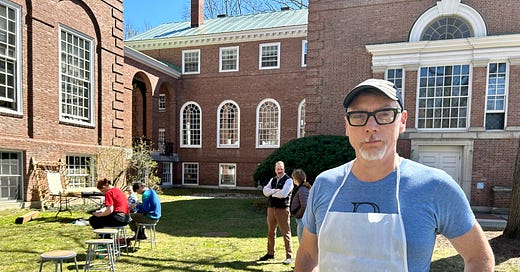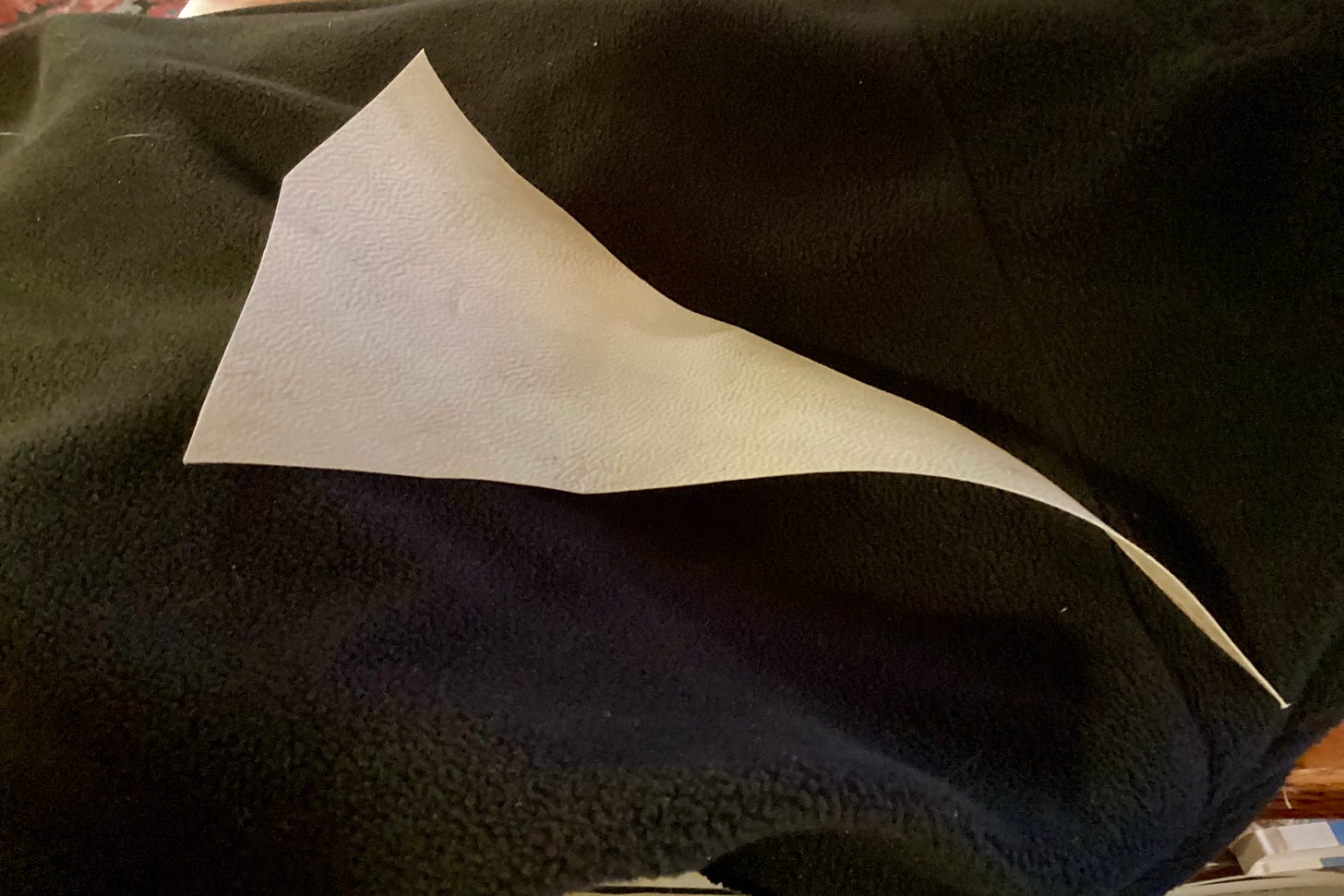Jesse Meyer, (photo above) runs a family business that dates back to 1550.
People frequently ask me how I find interesting stories for Artful, and while there is no single answer, I often respond that “I live in the Upper Valley and occasionally I leave the house.” Sometimes that is all that’s required. Plus being a little nosy/curious.
Last week on a short walk in Hanover, my husband and I came across a small group of people beginning to gather next to a sign that read “Parchment Demonstration.” We couldn’t stay, but wandered over to have a word. Jesse Meyer introduced himself and offered us each a generous scrap of parchment to check out the color and to get the feel of it.
Jesse, who previously worked for his father (now retired) and with his brother, is now the CEO of Pergamena, a boutique tannery located in New York’s Hudson Valley. Through a collaboration of the Book Arts Workshop at Dartmouth Libraries, the Classics Department and the Leslie Center for Humanities, Dartmouth had invited him to give two classes (in Ancient Technologies and Latin Paleography) and one public demonstration (for the Book Arts Workshop at Dartmouth Libraries) on the craft/occupation of parchment making. He also visited Rauner Library, where he “. . . looked at a selection of books from their rare book library to make note of various maker's marks, flaws, and raw material defects, which may be useful in identifying aspects of historical book, map, and scroll production.”
We chatted later through email. My first question: What is it like to work in a family business that dates back to 1550?
We have business records and civic records from North Bergen N.J. from the late 1800's indicating that the family has been tanning leather since at least 1550, originating in a town named Eisenberg, in what is now southeastern Germany. . . I/We love my/our work. It gives me purpose and pride, as well as fulfillment in carrying on a long family history. (2050 would be our 500th anniversary!)
Who are your customers? What do you produce?
Historically, for 150 years, we produced leather used by piano manufacturers, most famous among them . . . Steinway Piano Company. Since around 1975, we produced leather used as sole leather for bowling shoes. More recently, we have produced vegtan leather (traditional method of leather production employing tannins harvested from trees), as well as parchment and vellum, which I rediscovered and refined over the course of the last 25 years. Our vegtan leathers are primarily used in traditional bookbinding, leather goods, luxury footwear, furniture, and garment leather. Our parchment is traditonally used for manuscript and book production, calligraphed pages, botanical painting and printing, as well as drum and percussion instruments, lampshades, high end furniture veneers and interior wall coverings.
Jesse spoke thoughtfully about the challenge of running his business:
. . .[I]t can involve tremendous pressure to constantly reinvent and run a small business in a national environment that values white collar occupations over blue collar and hand crafted manufacturing. I experience first hand the irony of people who are impressed and amazed that we have a family-run domestic small manufacturing business but don't understand or appreciate the monetary value associated with this, nor do they understand the hurdles and hostile climate that exist trying to manufacture specialty high quality goods here in the United States. Every day, we as a country are becoming further and further removed from the concept of making quality tangible goods in service of chasing the lowest cost and the highest profit.
Back to the year 1550. Few businesses can boast of—and trace—a lineage of that length. By comparison, Twinings Tea Company, known for its longevity, was founded in 1706, now with a 10th-generation family owner. Zildjian, a cymbal manufacturer (supplier to, among others, the Beatles and the Rolling Stones) was founded in Istanbul during the Ottoman Empire before moving to the United States; it celebrated its 400thanniversary in 2023. Closer to home, the Tuttle Farm in Dover NH, founded in 1638, was the oldest family farm in the United States, run by eleven generations until the final part of it was sold in 2010 to become the Tendercrop Farm.
——————————————————
Thank you! You’re reading Artful, a blog about arts and culture in the Upper Valley, and I hope you’ll subscribe (still free) and then share this post with your friends and on your social media. We are just over 2800 subscribers.
And in case you are wondering . . . Susan B. Apel shuttered a lifelong career as a law professor to continue an interest (since kindergarten) in writing. Her freelance business, The Next Word, includes literary and feature writing; her work has appeared in a variety of lit mags and other publications including Art New England, The Woven Tale Press, The Arts Fuse, and Persimmon Tree. She connects with her neighbors through Artful, her blog about arts and culture in the Upper Valley. She’s in love with the written word..




